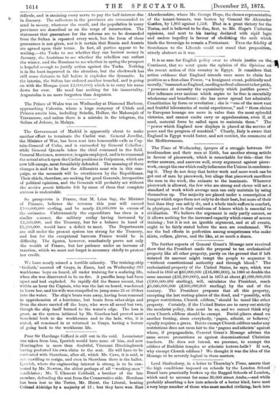The further reports of General Grant's Message now received show
that the President made the proposal to tax ecclesiastical property like all other property, partly on the ground that if left untaxed its amount might tempt the people to sequester it "without constitutional authority and through blood." The ecclesiastical property of the United States, he says, which was valued in 1850 at #83,000,000 (£16,680,000), in 1860 at double the same amount (£33,200,000), and in 1875 at about $1,000,000,000, (£200,000,000 sterling), will, calculates the President, reach_ $3,000,000,000 (£500,000,000 sterling) by the end of the century. The President proposes that all this property, excepting the last resting-places of the dead, and " possibly, with proper restrictions, Church edifices," should be taxed like.ther property. Certainly, if the United States are to carry out strictly the secularist policy, this must be so, and we cannot think why even Church edifices should be exempt. Burial-places stand on another footing, since everybody, pagan, atheist, or believer,' equally requires a grave. But to exempt Church edifices under any restrictions does not seem fair to the pagans and atheists' against whom, if propagandists, General Grant's Message advises the same 'severe precautions as against denominational Christian teachers. He does not intend, we presume, to exempt the edifices of Buddhist temples or atheistic lecture-halls ? If not, why exempt Church edifices ? We thought it was the idea of the Message to be severely logical in these matters.


































 Previous page
Previous page